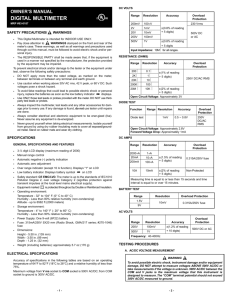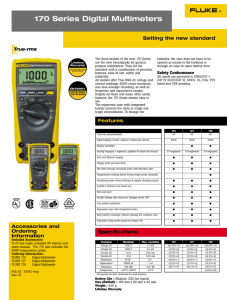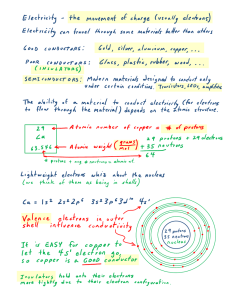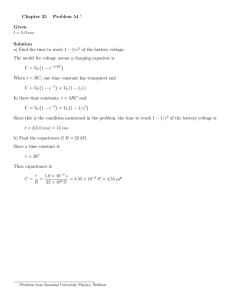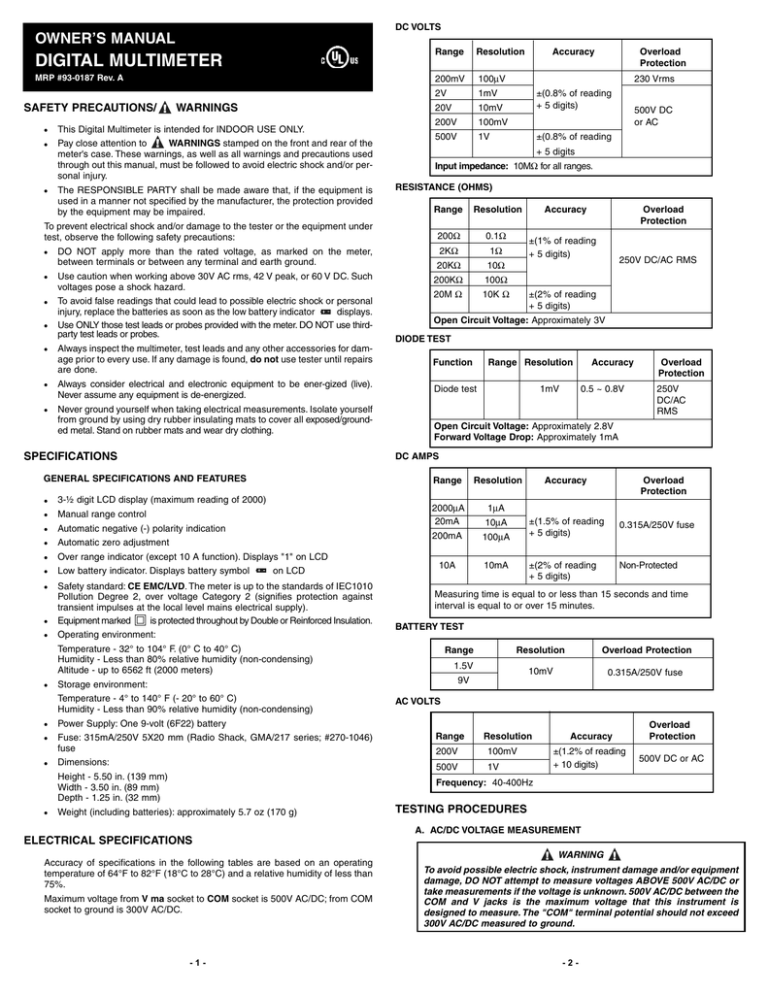
DC VOLTS
OWNER’S MANUAL
Range
DIGITAL MULTIMETER
MRP #93-0187 Rev. A
SAFETY PRECAUTIONS/
WARNINGS
•
This Digital Multimeter is intended for INDOOR USE ONLY.
•
Pay close attention to
WARNINGS stamped on the front and rear of the
meter's case. These warnings, as well as all warnings and precautions used
through out this manual, must be followed to avoid electric shock and/or personal injury.
•
The RESPONSIBLE PARTY shall be made aware that, if the equipment is
used in a manner not specified by the manufacturer, the protection provided
by the equipment may be impaired.
To prevent electrical shock and/or damage to the tester or the equipment under
test, observe the following safety precautions:
Resolution
200mV
100μV
2V
1mV
20V
10mV
200V
100mV
500V
1V
Accuracy
Overload
Protection
230 Vrms
±(0.8% of reading
+ 5 digits)
±(0.8% of reading
+ 5 digits
Input impedance: 10MΩ for all ranges.
RESISTANCE (OHMS)
Range
Resolution
200Ω
0.1Ω
2KΩ
1Ω
20KΩ
10Ω
Accuracy
Overload
Protection
±(1% of reading
+ 5 digits)
•
DO NOT apply more than the rated voltage, as marked on the meter,
between terminals or between any terminal and earth ground.
•
Use caution when working above 30V AC rms, 42 V peak, or 60 V DC. Such
voltages pose a shock hazard.
200KΩ
100Ω
To avoid false readings that could lead to possible electric shock or personal
injury, replace the batteries as soon as the low battery indicator
displays.
Use ONLY those test leads or probes provided with the meter. DO NOT use thirdparty test leads or probes.
20M Ω
10K Ω
Open Circuit Voltage: Approximately 3V
•
•
Function
•
Always consider electrical and electronic equipment to be ener-gized (live).
Never assume any equipment is de-energized.
Diode test
•
Never ground yourself when taking electrical measurements. Isolate yourself
from ground by using dry rubber insulating mats to cover all exposed/grounded metal. Stand on rubber mats and wear dry clothing.
SPECIFICATIONS
±(2% of reading
+ 5 digits)
Range Resolution
1mV
•
3-½ digit LCD display (maximum reading of 2000)
•
Manual range control
•
Automatic negative (-) polarity indication
•
Automatic zero adjustment
•
Over range indicator (except 10 A function). Displays "1" on LCD
•
Low battery indicator. Displays battery symbol
•
•
Safety standard: CE EMC/LVD. The meter is up to the standards of IEC1010
Pollution Degree 2, over voltage Category 2 (signifies protection against
transient impulses at the local level mains electrical supply).
Equipment marked
is protected throughout by Double or Reinforced Insulation.
•
Operating environment:
0.5 ~ 0.8V
Overload
Protection
250V
DC/AC
RMS
Open Circuit Voltage: Approximately 2.8V
Forward Voltage Drop: Approximately 1mA
on LCD
Range
Resolution
2000μA
20mA
10μA
200mA
100μA
10A
10mA
1μA
Range
±(1.5% of reading
+ 5 digits)
0.315A/250V fuse
±(2% of reading
+ 5 digits)
Non-Protected
Resolution
Overload Protection
10mV
0.315A/250V fuse
1.5V
9V
AC VOLTS
•
Power Supply: One 9-volt (6F22) battery
•
Fuse: 315mA/250V 5X20 mm (Radio Shack, GMA/217 series; #270-1046)
fuse
Range
200V
100mV
•
Dimensions:
500V
1V
Height - 5.50 in. (139 mm)
Width - 3.50 in. (89 mm)
Depth - 1.25 in. (32 mm)
Overload
Protection
BATTERY TEST
Storage environment:
Temperature - 4° to 140° F (- 20° to 60° C)
Humidity - Less than 90% relative humidity (non-condensing)
Accuracy
Measuring time is equal to or less than 15 seconds and time
interval is equal to or over 15 minutes.
Temperature - 32° to 104° F. (0° C to 40° C)
Humidity - Less than 80% relative humidity (non-condensing)
Altitude - up to 6562 ft (2000 meters)
•
Accuracy
DC AMPS
GENERAL SPECIFICATIONS AND FEATURES
•
250V DC/AC RMS
DIODE TEST
Always inspect the multimeter, test leads and any other accessories for damage prior to every use. If any damage is found, do not use tester until repairs
are done.
•
500V DC
or AC
Resolution
Accuracy
±(1.2% of reading
+ 10 digits)
Overload
Protection
500V DC or AC
Frequency: 40-400Hz
Weight (including batteries): approximately 5.7 oz (170 g)
TESTING PROCEDURES
A. AC/DC VOLTAGE MEASUREMENT
ELECTRICAL SPECIFICATIONS
Accuracy of specifications in the following tables are based on an operating
temperature of 64°F to 82°F (18°C to 28°C) and a relative humidity of less than
75%.
Maximum voltage from V ma socket to COM socket is 500V AC/DC; from COM
socket to ground is 300V AC/DC.
-1-
WARNING
To avoid possible electric shock, instrument damage and/or equipment
damage, DO NOT attempt to measure voltages ABOVE 500V AC/DC or
take measurements if the voltage is unknown. 500V AC/DC between the
COM and V jacks is the maximum voltage that this instrument is
designed to measure. The "COM" terminal potential should not exceed
300V AC/DC measured to ground.
-2-
1.
2.
3.
4.
Plug the BLACK test lead into "COM" jack of the multimeter; plug the RED
test lead into the "V" jack.
Set the meter’s Function/Range Selector Switch to the appropriate ACV or
DCV position as desired.
Place the RED test lead onto the positive (+) side of the item being tested
and the BLACK test lead onto the negative (-) (across the source/load) side
of the item. BE CAREFUL not to touch any energized conductors with any
part of your body.
Read the results on the display.
B. RESISTANCE MEASUREMENT Ω (OHMS)
WARNING
Ω" jack of the multimeter; plug the BLACK
Plug the RED test lead into the "Ω
test lead into the "COM" jack.
2.
Ω" range
Set the meter’s Function/Range Selector Switch to the OHM "Ω
function.
3.
Place the RED test lead onto one side of the item being tested and the
BLACK test lead onto the other side of the item. (Polarity does not matter
when checking resistance).
4.
Read the results on the display.
C. DIODE TEST
WARNING
To avoid electrical shock and/or damage to the multimeter, ensure the
power is removed from the circuit before any DIODE testing procedure is
conducted.Test diodes on de-energized (dead) circuits only, never on live
circuits.
1.
Plug the RED test lead into the
test lead into the "COM" jack.
jack of the multimeter; plug the BLACK
2.
Set the meter’s Function/Range Selector Switch to the
3.
Place the RED test lead onto one side of the diode being tested and the
BLACK test lead onto the other side.
4.
Read the results on the display.
5.
Reverse the test leads and again read the results on the display. Compare
the two readings. One reading should indicate a voltage drop value; the
other reading should indicate an overrange (1) condition.
position.
D. DC CURRENT MEASUREMENT (AMPS)
WARNING
To prevent electrical shock when performing current measurements,
follow all steps as indicated below DO NOT skip any steps or take any
short cuts.
The DC10A range is not fused. To avoid current hazard and/or damage
to the tester, DO NOT try to take measurements on circuits that have
more than 10 amps. DO NOT take more than 15 seconds to take the
reading. A waiting period of AT LEAST 15 MINUTES is necessary
between every 15 second testing period.
1.
Plug the RED test lead into the "mA" or the "DC10A" jack of the multimeter, as applicable; plug the BLACK test lead to the "COM" jack.
2. Set the meter's Function/Range Selector Switch to the appropriate Amps
range position as desired.
• To measure from 0 to 200mA, set the Selector Switch to the desired
"DCmA" position.
• To measure from 200mA to 10 Amps DC, set the Selector Switch to the
"DC10A" position.
3. Disconnect the battery, or shut off the power to the circuit being tested.
4. Disconnect one end of the wire or device, from the circuit where current will
be measured.
5. Place the RED test lead on the disconnected wire and place the BLACK
test lead at the location from which the wire was disconnected (series connection).
6. Reconnect the battery, or apply power to the circuit being tested.
7. Read the results on the display.
CAUTION: After the test is completed, shut the power off to the circuit
before removing the test leads and before reconnecting any disconnected
wires or devices.
-3-
1.
Plug the RED test lead into the "BAT." jack of the multimeter; plug the
BLACK test lead into the "COM" jack.
2.
Determine the voltage rating of the battery to be tested.
3.
Set the meter’s Function/Range Selector Switch to the desired "Battery
Test" range.
4.
Place the RED test lead on the positive post of the battery under test; place
the BLACK lead on the negative post.
5.
Read the results on the display.
MAINTENANCE
Resistance measurements must be made on "de-energized" (dead) circuits ONLY. Impressing a voltage across the multimeter's terminals while
set to any resistance range may result in electric shock, instrument damage and/or damage to equipment under test. MAKE SURE equipment is
completely de-energized before taking any resistance measurements.
1.
E. BATTERY TEST
1.
No periodic maintenance is required other than the replacement of the battery,
the fuse, and visual inspection of the meter.
2.
Keep the meter clean and dry. DO NOT use solvent to clean, use a damp
(not wet) cloth and fully dry after cleaning.
BATTERY AND FUSE REPLACEMENT
WARNING
When replacing the battery or the fuse, remove only the rear panel. Do
not remove or disassemble the circuit board or the front panel, these
items are not serviceable and if disassembled there is the possibility of
loose metal parts shorting the circuit board and causing an electrocution danger to the user.
1.
Turn the Digital Multimeter “OFF” and remove the test leads.
2.
Remove the two screws on the back of the meter and separate the case.
3.
Replace the fuse or battery as necessary:
For battery replacement: Remove the battery from the battery compartment and replace only with one 9-volt alkaline battery.
• For fuse replacement: Remove the fuse from the fuse holder and
replace with a 0.315A/250V - UL Listed Bussmann, GMA Type
(Radio Shack GMA/270 series; #270-1046 ) fuse.
NOTE: Use a 0.315A/250V, 5x20mm type fuse ONLY - Bussmann, GMA Type
(Radio Shack #270-1046 or similar). Using an incorrect fuse may result in serious injury and/or damage to the unit.
•
4.
Reassemble the case and secure with the two screws.
LIMITED ONE YEAR WARRANTY
The Manufacturer warrants to the original purchaser that this unit is free of
defects in materials and workmanship under normal use and maintenance for
a period of one (1) year from the date of original purchase. If the unit fails within the one (1) year period, it will be repaired or replaced, at the Manufacturer’s
option, at no charge, when returned prepaid to the Service Center with Proof
of Purchase. The sales receipt may be used for this purpose. Installation labor
is not covered under this warranty. All replacement parts, whether new or
remanufactured, assume as their warranty period only the remaining time of
this warranty. This warranty does not apply to damage caused by improper
use, accident, abuse, improper voltage, service, fire, flood, lightning, or other
acts of God, or if the product was altered or repaired by anyone other than the
Manufacturer’s Service Center. The Manufacturer, under no circumstances
shall be liable for any consequential damages for breach of any written warranty of this unit. This warranty gives you specific legal rights, and you may
also have rights, which vary from state to state. This manual is copyrighted with
all rights reserved. No portion of this document may be copied or reproduced
by any means without the express written permission of the Manufacturer.
THIS WARRANTY IS NOT TRANSFERABLE. For service, send via U.P.S. (if
possible) prepaid to Manufacturer. Allow 3-4 weeks for service/repair.
SERVICE PROCEDURES
If you have any questions, require technical support or information on
UPDATES and OPTIONAL ACCESSORIES, please contact your local store,
distributor or the Service Center.
USA & Canada:
Technical Service Center
17352 Von Karman Ave.
Irvine, CA 92614 U.S.A.
(800) 544-4124 (6:00 AM-6:00 PM, 7 days a week PST)
All others: (714) 241-6802 (6:00 AM-6:00 PM, 7 days a week PST)
FAX: (714) 241-3979 (24 hr.)
Web: www.EQUUS.com
Copyright © 2013 IEC. All Rights Reserved.
-4-

